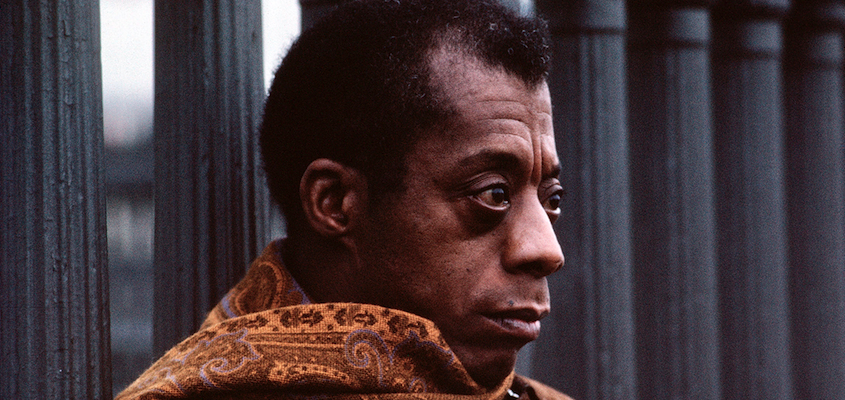BLACK AGENDA REPORT


James Baldwin on white madness–and Black resistance.
In An Open Letter to My Sister Angela Y. Davis , James Baldwin gave us a haunting vision of fascism’s creeping death march. Published in the New York Review of Books in January 1971, the letter was written on November 18, 1970, about a month after Davis was captured by the FBI. The letter was Baldwin’s disturbed response, in part, to a photograph of Davis on the cover of Newsweek following her capture: she appeared handcuffed and manacled, chained. It was an image that brought Baldwin back to an earlier period in US history, a period that Baldwin realized was still very much alive in the present – especially for United States whites.
Indeed, Baldwin’s letter castigates US whites for taking “refuge in their whiteness,” and allowing their leaders to imprison thousands and slaughter millions on the way to all-out race war. Baldwin’s present is our own. We are living through an intensified wave of white madness and now, as then, many white folk have chosen silence, or active class collaboration in the name of the white race. Yet the white supremacist chickens will come home to roost: Baldwin warned that the “fate intended for you, Sister Angela…is a fate which is about to engulf them, too,” and that these whites “will perish…in their delusions.”
But Baldwin’s letter is also a public offering of solidarity for a younger generation of US Blacks – like Davis, like George and Jonathan Jackson, like many others – attempting to carry forward the struggles of older generations against white supremacist savagery.
As an elder, Baldwin offered these words of support: “we must fight for your life as though it were our own — which it is — and render impassable with our bodies the corridor to the gas chamber. For, if they take you in the morning, they will be coming for us that night.”
Baldwin’s ultimate message, Black people, is this: “We cannot awaken this sleeper, and God knows we have tried. We must do what we can do, and fortify and save each other…”
We reprint Baldwin’s letter below.
An Open Letter to My Sister, Miss Angela Y. Davis
James Baldwin
Dear Sister:
One might have hoped that, by this hour, the very sight of chains on Black flesh, or the very sight of chains, would be so intolerable a sight for the American people, and so unbearable a memory, that they would themselves spontaneously rise up and strike off the manacles. But, no, they appear to glory in their chains; now, more than ever, they appear to measure their safety in chains and corpses. And so, Newsweek, civilized defender of the indefensible, attempts to drown you in a sea of crocodile tears (“it remained to be seen what sort of personal liberation she had achieved”) and puts you on its cover, chained.
You look exceedingly alone—as alone, say, as the Jewish housewife in the boxcar headed for Dachau, or as any one of our ancestors, chained together in the name of Jesus, headed for a Christian land.
Well. Since we live in an age which silence is not only criminal but suicidal, I have been making as much noise as I can, here in Europe, on radio and television—in fact, have just returned from a land, Germany, which was made notorious by a silent majority not so very long ago. I was asked to speak on the case of Miss Angela Davis, and did so. Very probably an exerciser in futility, but one must let no opportunity slide.
I am something like twenty years older than you, of that generation, therefore, of which George Jackson ventures that “there are no healthy brothers—none at all.” I am in no way equipped to dispute this speculation (not, anyway, without descending into what, at the moment, would be irrelevant subtleties) for I know too well what he means. My own state of health is certainly precarious enough. In considering you, and Huey, and George and (especially) Jonathan Jackson, I began to apprehend what you may have had in mind when you spoke of the uses to which we could put the experience of the slave. What has happened, it seems to me, and to put it far too simply, is that a whole new generation of people have assessed and absorbed their history, and, in that tremendous action, have freed themselves of it and will never be victims again. This may seem an odd, indefensibly pertinent and insensitive thing to say to a sister in prison, battling for her life—for all our lives. Yet, I dare to say it, for I think you will perhaps not misunderstand me, and I do not say it, after all, from the position of spectator.
I am trying to suggest that you—for example—do not appear to be your father’s daughter in the same way that I am my father’s son. At bottom, my father’s expectations and mine were the same, the expectations of his generation and mine were the same; and neither the immense difference in our ages nor the move from the South to the North could alter these expectations or make our lives more viable. For, in fact, to use the brutal parlance of that hour, the interior language of despair, he was just a n—–—a n—– laborer preacher, and so was I. I jumped the track but that’s of no more importance here, in itself, than the fact that some poor Spaniards become rich bull fighters, or that some poor Black boys become rich—boxers, for example. That’s rarely, if ever, afforded the people more than a great emotional catharsis, though I don’t mean to be condescending about that, either. But when Cassius Clay became Muhammad Ali and refused to put on that uniform (and sacrificed all that money!) a very different impact was made on the people and a very different kind of instruction had begun.
The American triumph—in which the American tragedy has always been implicit—was to make Black people despise themselves. When I was little I despised myself; I did not know any better. And this meant, albeit unconsciously, or against my will, or in great pain, that I also despised my father. And my mother. And my brothers. And my sisters. Black people were killing each other every Saturday night out on Lenox Avenue, when I was growing up; and no one explained to them, or to me, that it was intended that they should; that they were penned where they were, like animals, in order that they should consider themselves no better than animals. Everything supported this sense of reality, nothing denied it: and so one was ready, when it came time to go to work, to be treated as a slave. So one was ready, when human terrors came, to bow before a white God and beg Jesus for salvation—this same white God who was unable to raise a finger to do so little as to help you pay your rent, unable to be awakened in time to help you save your child!
There is always, of course, more to any picture than can speedily be perceived and in all of this—groaning and moaning, watching, calculating, clowning, surviving, and outwitting, some tremendous strength was nevertheless being forged, which is part of our legacy today. But that particular aspect of our journey now begins to be behind us. The secret is out: we are men!
But the blunt, open articulation of this secret has frightened the nation to death.
Black Agenda Report for more
